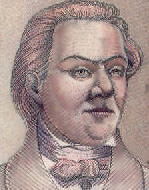The directory «Plots»
Gama Jose Basilio da
(1741—1795)

Brazilian poet, born in the district of Rio-das-Mortes, Brazil, in 1740; died in Lisbon, Portugal, 31 July 1795. He belonged to a poor family, was brought to Rio Janeiro at an early age by a monk of St. Francis, and was educated by the Jesuits, who afterward received him into their order. He was reduced to great poverty after the missionaries were expelled from Brazil, but finally succeeded in entering a seminary, where he studied the scholastic philosophy. He then went to Portugal, and from there to Italy. He returned to Portugal in 1775, being called by the marquis of Pombal to celebrate the unveiling of an equestrian statue of king Joss I., in an ode, which was awarded the prize, and Gama was given a place in the department of state and a patent of nobility. After the downfall of Pombal, Gama lost his office and went to Brazil, where he founded an academy of Arcadians modeled after that of Rome, which was dissolved by the viceroy, Count of Rezende, under suspicion that it was a political association. Gama was sent as a prisoner to Portugal in 1785, narrowly escaped banishment to Angola, and was only set at liberty in 1786. About this period he became an enemy of the Jesuits, and published his poem of " Uruguay" (1789), the object of which is to show that they had attempted to found an independent state among the Indians of that province. The poem of " Uruguay" contains some clever descriptions of the forest scenery of South America, but, while inveighing against the Jesuits, says nothing of the civilization they introduced, or of its destruction by their banishment from the colonies of Spain and Portugal. Da Gama afterward was elected a member of the Academy of Lisbon. He is buried in the Church of Boa Hora in that City. He also published "Lenitivo da Sandade do principe D. Jose" (1788), and "Quitubia," another poem, named after a Negro chief who assisted the Portuguese in an expedition against Angola (1791).
Brazil, 1991, Jose Basilio da Gama